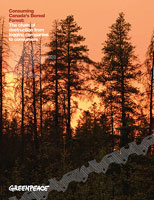
News |
- Companies Singled Out for Boreal Destruction
- Protected Forests Better Than Biofuels
- Mega-Shopping Complex Lands in Court
- Misipawistic Cree Push For Protected Land
- Manitoba Hydro to Rebuild Pointe du Bois Dam
- World Water Week Calls For Action
- Global Car Industry Revs Up
- Paris Cycling Scheme
- Misipawistik Cree Nation Hosts National Gathering
- UN Focuses on Declaration of Rights
- Groups Say Canada Violates Seal Hunt Laws
- Greenpeace Calls for Nuclear Phase Out
| Companies Singled Out for Boreal Destruction | 28 August 07 |
 Greenpeace Canada released an investigative report that singles out 35 Canadian, American, and European corporations as the worst offenders in the destruction of Canada's Boreal Forest for everyday consumer products. Greenpeace Canada released an investigative report that singles out 35 Canadian, American, and European corporations as the worst offenders in the destruction of Canada's Boreal Forest for everyday consumer products.The August 2007 report criticizes four main logging companies, Abitibi-Consolidated, Bowater, Kruger and SFK Pulp, accusing them of degrading or fragmenting nearly 200,000 square kilometres of the Canada's boreal. Common products manufactured by the companies include books, magazines, copy paper, flyers, newspapers, and lumber from trees in critically endangered areas of the Boreal Forest. The report also singles out many well-known businesses such as Best Buy, Grand & Toy, Time Inc., Sears, Coles/Indigo, Rona and Toys "R" Us, for encouraging the practices of the logging companies because of their magazines, flyers or products. The report is part of a new campaign highlighting the scale of destruction in the Canada's boreal forest and urging customers of the logging companies to temporarily suspend their contracts until action is taken to protect the boreal forest and end destructive logging. View August 20, 2007 Greenpeace press release View August 21, 2007 CanWest News article in the Vancouver Sun View August 14, 2007 Greenpeace report, Consuming Canada's Boreal Forest: The Chain of Destruction from Logging Companies to Consumers (PDF)  Take Action and send a message to the CEOs of Abitibi Consolidated, Bowater and Kruger Take Action and send a message to the CEOs of Abitibi Consolidated, Bowater and KrugerSources: Greenpeace, CanWest News
|
|
| Protected Forests Better Than Biofuels | 28 August 07 |
 Restoring and/or simply protecting forests would result in a much greater reduction of the carbon load in the atmosphere than dedicating vast tracts of land to "energy crops," according to a new report published August 17, 2007 in the journal Science. Restoring and/or simply protecting forests would result in a much greater reduction of the carbon load in the atmosphere than dedicating vast tracts of land to "energy crops," according to a new report published August 17, 2007 in the journal Science.The report assesses biofuels - produced by using everything from sugar cane to wheat - and compared carbon emissions associated with their use over the next 30 years. "In all cases, forestation on an equivalent area of land would sequester two to nine times more carbon over a 30-year period than emissions avoided by use of a biofuel," says the report by Renton Righelato of World Land Trust and Dominick Spracklen of University of Leeds in England. The findings boost existing arguments that biofuel production is having a serious environmental impact around the globe - energy crops require an enormous amount of land and clearing grasslands and forests to grow energy crops releases carbon stored in existing vegetation, waterways, peatlands, and soil. Prime Minister Stephen Harper recently announced a $1.5-billion, nine-year plan to make Canada a leader in biofuel production. View August 17, 2007 CanWest News article in the Victoria Times Colonist Sources: CanWest News
|
|
| Mega-Shopping Complex Lands in Court | 28 August 07 |
 The Center for Biological Diversity launched a lawsuit against the City of Perris, California challenging its approval of a 520,000-square-foot, big-box retail complex, including a 24-hour Wal-Mart Supercenter, to generate 40,000 daily vehicle trips. The Center for Biological Diversity launched a lawsuit against the City of Perris, California challenging its approval of a 520,000-square-foot, big-box retail complex, including a 24-hour Wal-Mart Supercenter, to generate 40,000 daily vehicle trips.The Center alleges the project fails to consider measures to reduce greenhouse gas emissions that cause global warming. The California Environmental Quality Act requires state and local governments to assess and reduce significant environmental impacts of new projects. Center staff attorney Matt Vespa said greenhouse gas emissions are not analyzed in the environmental impact report for the project, which the Perris City Council certified last month. "Wal-Mart's public-relations department wants you to believe the company is aggressively fighting global warming, but at the end of the day their project fails to meet even the minimum standards required by California law" said Vespa. View August 13, 2007 Center for Biological Diversity release View August 14, 2007 Press-Enterprise article Visit Wal-Mart's Sustainability pages Sources: Center for Biological Diversity, The Press-Enterprise
|
|
| Misipawistic Cree Push For Protected Land | 22 August 07 |
 The Chief of the Misipawistic Cree Nation at Grand Rapids, Ovide Mercredi, says he rejects the idea of a National Park that would include his First Nation's traditional territory because he doesn't trust Parks Canada to protect the lands and prevent Banff-style development for tourists.
The Chief of the Misipawistic Cree Nation at Grand Rapids, Ovide Mercredi, says he rejects the idea of a National Park that would include his First Nation's traditional territory because he doesn't trust Parks Canada to protect the lands and prevent Banff-style development for tourists.Chief Mercredi says the Cree already do a better job than the federal or provincial governments when it comes to preserving the environment. Instead, the community is exploring the idea of creating a mechanism to protect land be governed by the Cree, including traditional land use in areas such as Long Point and tourism north of the existing First Nation community. Technical work and Federal-Provincial discussions about a Manitoba lowlands national park have been ongoing for 15 years. Manitoba Premier Doer promised in the 2007 spring election, new legislation for provincial protection of First Nation traditional lands. View the August 11, 2007 Winnipeg Free Press article View the Manitoba Wildlands Lowlands page Source: Winnipeg Free Press
|
|
| Manitoba Hydro to Rebuild Pointe du Bois Dam | 22 August 07 |
 Manitoba Hydro is planning to 'modernize' (rebuild) the Pointe du Bois generating facilities by constructing new generating facilities adjacent to the existing ones.
Manitoba Hydro is planning to 'modernize' (rebuild) the Pointe du Bois generating facilities by constructing new generating facilities adjacent to the existing ones.The plan is to decommission the old dam infrastructure - which has been in operation since 1911 - once the new facilities are operating. The Pointe du Bois dam is located within Whiteshell Provincial Park and is the oldest hydroelectric plant operating in Manitoba. Manitoba Hydro filed a proposal under Manitoba's Environment Act July 31, 2007 and plans to submit an environmental impact statement for the project towards the end of 2008. Manitoba's Environmental Assessment and Licensing Branch is accepting public comments on the proposal and draft scoping document filed by Manitoba Hydro until September 25, 2007. View Manitoba Hydro's July 31, 2007 Environment Act Proposal and Draft Scoping Document for the Pointe du Bois Modernization Project (PDF) View the listing of Manitoba Hydro's Open Houses Visit Manitoba Conservation Environmental Assessment and Licensing Branch for the Pointe du Bois Modernization Project Source: Manitoba Environmental Assessment and Licensing, Winnipeg Free Press
|
|
| World Water Week Calls For Action | 22 August 07 |
 The 17th annual World Water Week began with a call for governments around the world to better manage existing water resources and concluded with the message that in the face of global poverty, critical lack of sanitation, water scarcity and climate change, we all need to do much better.
The 17th annual World Water Week began with a call for governments around the world to better manage existing water resources and concluded with the message that in the face of global poverty, critical lack of sanitation, water scarcity and climate change, we all need to do much better.The 2007 event took place in Stockholm August 12 - 18, attended by over 2,000 participants - scientists, business, government, UN agencies, water management and intergovernmental organizations - from more than 130 countries. The week's focus was on global water sustainability, which is crucial to maintaining a food supply, human health, energy supply and industrial production. Anders Berntell, Executive Director of the host Stockholm International Water Institute (SIWI), summarized the event: "There is progress, but there is still far too little action and now, when climate change is upon us, we need to adapt even faster. None of us can say we are prepared but it's clear poor people will again suffer the most. Changes in water availability will hit us first with an altered climate; rising sea levels and floods in certain regions, but drought in others. The question remains relevant: Why is water still not high enough on the political agenda?" View August 17, 2007 World Water Week release by Stockholm International Water Institute (PDF) Visit August 16, 2007 Independent Online article View August 13, 2007 CBC News article Source: Stockholm International Water Institute, CBC News
|
|
| Global Car Industry Revs Up | 21 August 07 |
 The world's auto manufacturers produced a record 67 million vehicles in 2006, putting more cars on the road than ever before, undermining the sector's efforts to reduce its contribution to climate change.
The world's auto manufacturers produced a record 67 million vehicles in 2006, putting more cars on the road than ever before, undermining the sector's efforts to reduce its contribution to climate change.According to the Worldwatch Institute (WRI), the EU remains the world's largest producer, manufacturing 27 percent of the vehicles on the market in 2006. China's contribution to the record-breaking 4 percent global increase was an increase in production of 30 percent. Production in China has more than quintupled in the last decade. Traffic congestion, road accidents, air pollution, climate change, and peak oil are challenges the world faces from car-centered transportation, according to Worldwatch Institute's State of the World 2007 report. "With more cars on the road year after year, regulating auto fuel consumption and emissions alone is not a solution. What is truly needed is a transportation revolution," says Renner of WRI. "Cities from Bogotá to London are decreasing their dependence on cars, and more cities could follow. We need denser cities with better land-use practices and a commitment to public transportation." View the July 18, 2007 Worldwatch Institute article View the July 19, 2007 EurActiv article Source: Worldwatch Institute, EurActiv
|
|
| Paris Cycling Scheme | 21 August 07 |
 Three weeks after Paris was sprinkled with 10,000 self-service bicycles at 750 racks, the world's biggest bike rental scheme is proving a triumph.
Three weeks after Paris was sprinkled with 10,000 self-service bicycles at 750 racks, the world's biggest bike rental scheme is proving a triumph.The giant fleet of Vélibs (short for free or freedom-bikes in French) is already showing signs of transforming a city, which, despite increasing cycle lanes, had never been pedal-friendly. Subscribers pay a modest annual fee, provide credit card details and leave a credit card deposit to join the Vélib scheme. This buys half an hour's pedalling a day and a card to lock and unlock bicycles from automated stations spaced every 300 metres in the city's centre. Visitors to Paris can buy weekly or daily Vélib cards. In the first three weeks of the program, the bikes were borrowed 1.2 million times. Each is being used six times a day on average, usually for the short trips that are encouraged by the pricing scheme. Lyon introduced an identical scheme back in 2005, followed by Barcelona in March of 2007. View the August 6, 2007 Times Online (UK) article View the July 15, 2007 BBC News article Source: Times Online (UK)
|
|
| Misipawistik Cree Nation Hosts National Gathering | 15 August 07 |
 The Misipawistik (Grand Rapids) Cree Nation in Manitoba is hosting Canada's 12th National Cree Gathering, August 13-17, 2007.
The Misipawistik (Grand Rapids) Cree Nation in Manitoba is hosting Canada's 12th National Cree Gathering, August 13-17, 2007.The traditional four-day festival is held in a different part of national Cree traditional territories every year. The Gathering is an opportunity to strengthen historical, spiritual, boreal forest culture, and political ties among the Cree Nations. The keynote speaker this year is former national grand Chief Matthew Coon-Come, whose ancestral home is among the James Bay Cree. The 2007 theme is "Proclaiming our Nationhood, through our territory, language, culture and traditions." Estimated at at least 300,000 strong, the Cree Nation is the largest Aboriginal nation and linguistic group in Canada. It counts one in every five aboriginal people as a member. Misipawistik First Nation Chief Ovide Mercredi expects 2,000 people to attend the Gathering. View the August 3, 2007 Winnipeg Free Press article (DOC) Visit the website of the 2007 National Cree Gathering Source: National Cree Gathering, Winnipeg Free Press
|
|
| UN Focuses on Declaration of Rights | 15 August 07 |
 The 2007 International Day of the World's Indigenous People (August 9) focus is on the decision before the United Nations General Assembly - endorsing the Declaration on the Rights of Indigenous Peoples.
The 2007 International Day of the World's Indigenous People (August 9) focus is on the decision before the United Nations General Assembly - endorsing the Declaration on the Rights of Indigenous Peoples.The Declaration, 20 years in the making, would establish international human rights standards for protection of the rights of indigenous peoples. UN High Commissioner for Human Rights, Louise Arbour emphasized it is "time to call upon member states of the United Nations to join as one and adopt the Declaration and thereby establish a universal framework for indigenous peoples' rights, social justice and reconciliation." UN Secretary-General Ban Ki-moon called for urgent action to deal with the discrimination, marginalization, extreme poverty and conflict the world's 370 million indigenous people continue to endure. In Canada, National Chief Phil Fontaine expressed dismay that Canada continues to oppose the United Nations Declaration on the Rights of Indigenous Peoples. "The Canadian government has not been able to provide an adequate explanation as to why it reversed its earlier support." National Chief Fontaine also noted that, "Canada's reputation as a fair and just country is suffering on the international stage." View August 9, 2007 United Nations article Visit the 2007 International Day of the World's Indigenous Peoples website View August 9, 2007 statement by Message of Louise Arbour, United Nations High Commissioner for Human Rights View August 9, 2007 Assembly of First Nation press release View December 18, 2006 Manitoba Wildlands' news item View August 14, 2007 INQUIRER.com Source: United Nations, Assembly of First Nations
|
|
| Groups Say Canada Violates Seal Hunt Laws | 14 August 07 |
 The Commission for Environmental Cooperation (CEC) is considering a submission that alleges violations of harp seal hunt laws in Canada's Gulf of St. Lawrence and Newfoundland and Labrador coast hunts.
The Commission for Environmental Cooperation (CEC) is considering a submission that alleges violations of harp seal hunt laws in Canada's Gulf of St. Lawrence and Newfoundland and Labrador coast hunts.Two Mexican conservation groups made a formal submission to NAFTA's CEC June 25, 2007. They are asking Canada be held accountable for failing to apply the precautionary principle when it sets the annual harp seal hunting quota. (Article 2(1) of the Canadian Environmental Protection Act and preamble to Canada's Oceans Act) Canada allowed the quota to be exceeded four of the past five years. The groups also allege most hunters do not strictly comply with rules that prescribe instruments and methods for killing seals (Articles 28 and 29 of the Marine Mammal Regulations adopted under the federal Fisheries Act). On July 13th, the CEC ruled the submission did not meet all of its criteria and the groups had 30 days to revise their submission. The CEC citizen submission mechanism allows citizens to play an active "whistleblower" role in matters relating to environmental law enforcement. Any citizen or nongovernmental organization may file a submission with the CEC Secretariat when it believes a NAFTA partner is failing to enforce its environmental law. View the July 9, 2007 Commission for Environmental Cooperation release View details regarding the Seal Hunting Submission of June 25, 2007 Source: Commission for Environmental Cooperation
|
|
| Greenpeace Calls for Nuclear Phase Out | 14 August 07 |
 Greenpeace Canada has launched a campaign to phase out nuclear power in Canada, citing its unreliability, health concerns related to waste, and massive costs.
Greenpeace Canada has launched a campaign to phase out nuclear power in Canada, citing its unreliability, health concerns related to waste, and massive costs. The environmental organization argues nuclear mega-projects projects regularly undergo delays and cost over-runs with no guarantee they operate well once started. More recently the July 8, 2007 announcement that two Ontario Pickering A nuclear units, down for unplanned maintenance for a month (at a cost of over two billion dollars), will be out of service for most of the summer. The reactors were expected to be back in operation by mid-June. The lengthy outage means Ontario is short 1,000 megawatts of domestic power generation during the summer - a period of high electricity demand due to dependence on air conditioning. View Greenpeace Canada's 'End the Nuclear Threat' campaign View information about Ontario's Pickering Nuclear Station View Greenpeace Canada's blog on nuclear power View the July 7, 2007 Toronto Star article Source: Greenpeace Canada, Toronto Star
|
|


 RSS Feeds:
RSS Feeds: